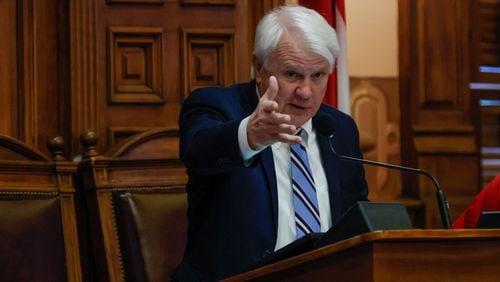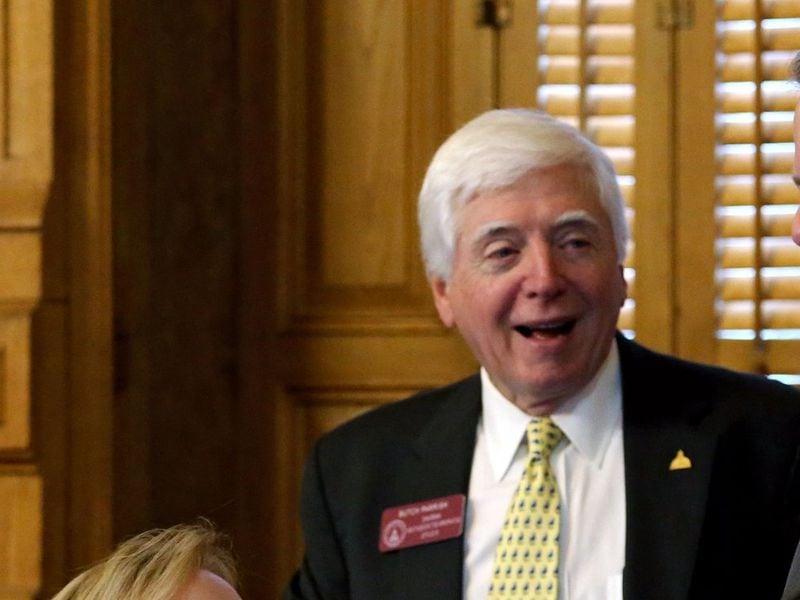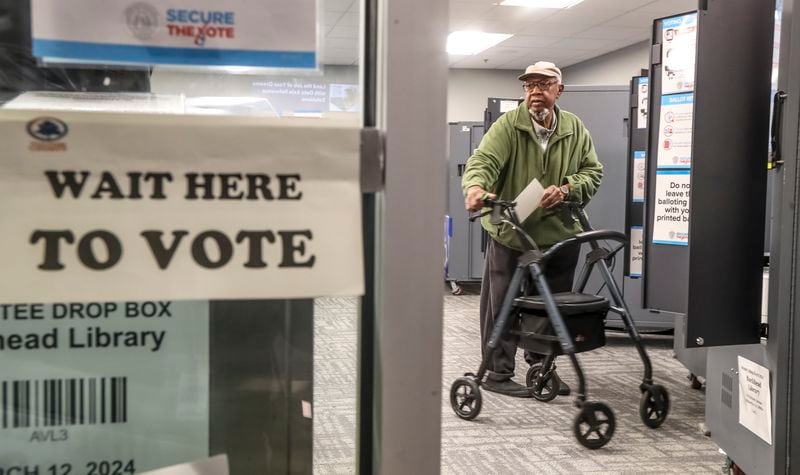Panel would study how to provide health care coverage for uninsured
Talk that this legislative session would see a deal reached to fully expand Medicaid appears to just be talk.
Now, a study committee will likely do the talking, focusing specifically on an Arkansas program that uses federal expansion funds to purchase private health care coverage for that state’s uninsured residents.
Meanwhile, hundreds of thousands of Georgians will continue to go without coverage.
Surveys over the years have shown Medicaid expansion to be a popular topic with Georgia voters. In an Atlanta Journal-Constitution poll in January, 69% of respondents said Georgia should expand eligibility for Medicaid, the health care program for poor and disabled Georgians.
But Georgia remains one of 10 states that have not accepted federal funding to expand Medicaid under the Affordable Care Act. Gov. Brian Kemp and other key Republicans have vigorously fought expansion, saying the program is too costly and inflexible in the long term. That’s even though the federal government would cover 90% of the cost of the expanded population, plus the state would qualify for an added incentive that would create a financial surplus.
Senior Republican leaders, however, entered this year’s session indicating they were open to a discussion about expanding Medicaid, possibly as part of a deal that would also roll back some regulations — possibly even eliminating them — to make it easier to build new hospitals.
State House Speaker Jon Burns and his deputies pressed the pause button this past week, though, proposing that the matter go to a study committee. Burns, however, made it clear he was open to discussing a broader expansion in 2025.
In a statement, Burns said he and other House Republican leaders remain “100% supportive” of a more limited expansion backed by Kemp.
That limited expansion, called Georgia Pathways to Coverage, launched in July and only extends coverage to residents who meet work or activity requirements. Through Dec. 15, fewer than 3,000 uninsured applicants have enrolled in Pathways out of an estimated 370,000 who could apply.
Democrats pushed for continuing efforts to approve a full expansion this year.
“We don’t need more meetings. We don’t need another study committee,” said Rep. Michelle Au, a Democrat from Johns Creek. “We do not need another joint commission to tabulate and recalculate the numbers that we already have.”
Credit: Bob Andres/AJC
Credit: Bob Andres/AJC
House leaders push plan to ease building of hospitals in rural counties
Republican leaders in the state House have proposed scaling back regulations to ease the way for smaller counties to build hospitals.
Under the state’s certificate of need rules — which were set up to control the costs of government reimbursements for Medicaid and Medicare — a significant demand for care must be demonstrated to allow a new hospital to be built.
That would no longer be necessary for counties with fewer than 50,000 people under House Bill 1339, sponsored by state Rep. Butch Parrish, a Republican from Swainsboro.
The rural hospitals would still have to meet certain requirements, including providing instruction for medical residency students and offering psychiatric care.
Hospitals worry that scaling back the certificate of need system, known widely as CON, will make them fight over talent and profit, while some — particularly in rural communities — say the process is burdensome, leads to years of delays and deters potential investment.
HB 1339 would leave intact other parts of CON, posing a potential problem in the state Senate, whose leaders have endorsed an effort to repeal the entire system.
Midyear budget clears Senate hurdle
It was the state Senate’s turn this past week to weigh in on the midyear budget, and it mostly stuck with the same proposals supported by Gov. Brian Kemp and the Georgia House on the spending plan that runs through June 30.
The plan calls for $5 billion in additional spending, with major expenditures to build a new medical school at the University of Georgia and roads, improve rural airports, pay for local water and sewer projects, and rural economic development. Helping fund that work will be $2 billion taken from the state’s undesignated reserves.
The Senate did set its own course on a package to support small-town airports. The House added $27 million for the airports in its plan. The Senate’s proposal climbed even higher, going up to $98 million.
Senate and House leaders will now work to come to an agreement on the plan, which helps pay for K-12 schools, colleges, public health care, prisons, policing, business regulation, roads and a host of other services.
Measure could lead to huge tax break
The state House Ways and Means Committee backed legislation this past week that would remove the 15% cap on how much of the state’s revenue from the previous year can be placed in a “rainy day” fund.
The rainy day fund currently accounts for nearly one-third of the $16 billion the state has in reserves.
The sponsor of House Bill 464, House Ways and Means Chair Shaw Blackmon, said that anything over 25% of the previous year’s revenue that’s left in the state’s surplus funds could be used to cut taxes — possibly through an income or property tax rebate like those given to state taxpayers the past two years.
The rainy day and undesignated funds currently amount to almost 50% of the previous year’s state revenue, so under HB 464, if passed, lawmakers could put about $8 billion toward tax cuts, although lawmakers have also already backed plans to spend some of the reserves in the midyear budget.
For a sense of scale, the state last year sent out income tax and property tax rebates totaling about $2 billion.
Credit: John Spink
Credit: John Spink
Turnout light as early voting begins for presidential primary
Early voting for Georgia’s presidential primary got off to a slow start.
About 16,000 Georgia voters turned out for the first day of early voting. That’s expected to increase as election day on March 12 nears.
Eleven Republicans and three Democrats — including many who have suspended their campaigns — are on the ballot that also features the front-runners, Republican Donald Trump and Democrat Joe Biden. Registered voters are eligible to vote in either party’s primary.
The state’s My Voter Page offers information about polling locations, voting hours and sample ballots at mvp.sos.ga.gov.
Credit: Courtesy photo
Credit: Courtesy photo
Savannah Convention Center expansion faces another delay
The completion of work expanding the Savannah Convention Center — a $276 million project, with Georgia taxpayers picking up the tab — faces another delay, causing a scramble as the city’s sales staff meets with planners across the country to manage the fallout.
The expansion was to be completed late last year, and convention center officials had booked conferences for the enlarged hall starting in January. Then the opening was pushed back to May.
The state agency overseeing the project, the Georgia State Financing and Investment Commission, announced this past week that the expansion’s opening would be delayed beyond May and could stretch into the final months of this year.
The convention center’s existing exhibition space remains open for conferences, but five larger events have already been canceled and an additional 22 conventions face adjustments, which include postponement or moving some activities to other Savannah-area event spaces.
Once the work is completed, capacity of the 24-year-old facility will double, making it one of the 75 largest exhibition halls in the country.
Senate backs legislation linked to college student fest that got out of hand
The Georgia House now has control over a state Senate bill that would give municipalities the power to seek financial damages from the organizers of special events staged without a permit.
The Senate voted 47-1 for Senate Bill 443.
The measure is a response to costs incurred by Tybee Island during last year’s Orange Crush beach bash, a spring break-like party for students at the region’s historically Black colleges and universities.
The 2023 Orange Crush attracted an estimated 50,000 attendees, overwhelming the 3.19-square-mile island’s parking and public safety resources. Reports that weekend included property damage, multiple traffic incidents, a physical assault and a road rage shooting.
School bus safety bill honors memory of Henry 8-year-old
State Rep. Lauren Daniel, R-Locust Grove, has introduced House Bill 1284, legislation that would quadruple fines for motorists passing a stopped school bus.
Daniel named the legislation after 8-year-old Adalynn Pierce of Henry County, who was killed by a passing driver as she was crossing the road to get onto her school bus.
Political expedience
Key support: Gov. Brian Kemp has formally endorsed former Columbia County Commissioner Gary Richardson over social media influencer C.J. Pearson in the March 12 runoff for an open House seat. Both candidates for the Augusta-based House District 125 are Republicans, although Richardson is more in line with Kemp’s wing of the party and Pearson hews toward the MAGA base of former President Donald Trump.
Federal election probe: Gov. Brian Kemp has talked to investigators in the office of Jack Smith, the special counsel who is prosecuting former President Donald Trump on charges of trying to subvert the 2020 election. The governor told CNN’s Kaitlan Collins that he discussed the same issues that he was questioned about in 2022 by a Fulton County special grand jury.
Gold Dome exit: State Rep. Penny Houston announced that she’ll retire at the end of the year after 13 terms in the House. Houston’s House District 170 includes Berrien County and portions of Cook and Tift counties. She is currently the chair of the House Appropriations subcommittee on economic development, which oversees the budgets for the Georgia Ports Authority, the Georgia World Congress Center and several state agencies.
New challenge: Marcus Flowers, who ran in 2022 in the 14th Congressional District against Republican U.S. Rep. Marjorie Taylor Greene — and raised more than $16 million doing it — has now turned his sights on the 13th Congressional District, represented by a fellow Democrat, U.S. Rep. David Scott. The district used to represent sections of southwest metro Atlanta but went through a transformation during the special legislative session on redistricting last year. It’s now situated on the city’s eastern edges, covering all of Rockdale County and parts of Clayton, DeKalb, Gwinnett, Henry and Newton counties.
Capitol Recap: The 2024 Legislative Session
Want to know what legislators did this past week and how it might affect you? Check out our weekly newsletter, Capitol Recap: The 2024 Legislative Session, every Friday.
To subscribe, go to https://www.ajc.com/subscribe-2024-legislative-session/.
About the Author












